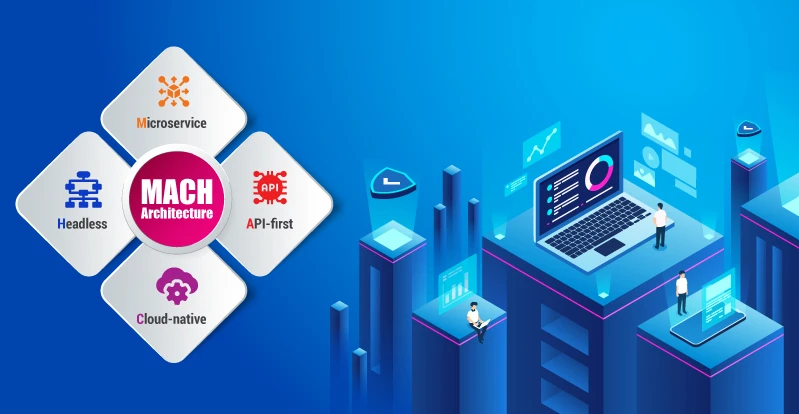
How Micro Services Architecture Powers Modern E-Commerce Platforms
Introduction:
As
e-commerce continues to grow and evolve, businesses are seeking ways to scale
efficiently, maintain flexibility, and deliver superior user experiences. One
of the most transformative approaches for achieving this is micro services
architecture. By breaking down complex systems into smaller, manageable
services, micro services provide e-commerce platforms with the agility they
need to meet the demands of modern consumers. This blog explores how micro
services architecture is reshaping e-commerce platforms and the benefits it
offers for both businesses and customers.
Whatis Micro services Architecture?
Definition: Micro
services architecture is a design approach where an application is built as a
collection of small, independent services that are loosely coupled but work together
to achieve a specific goal. Each micro service focuses on a single business
function and can be developed, deployed, and scaled independently.
In E-Commerce: For
e-commerce platforms, this means breaking down traditional monolithic systems
(where all components are tightly integrated) into smaller, more manageable
services, such as order management, payment processing, inventory control, user
authentication, and more.
Key
Benefits of Micro services in E-Commerce:
Scalability: Micro
services allow businesses to scale specific parts of their e-commerce platform
independently. For example, during peak shopping seasons, services like payment
gateways or order processing can be scaled up without affecting other
components, ensuring consistent performance.
Flexibility in
Development: Different micro services can be built using the most appropriate
technology for each function. For instance, the payment service could be built
using a technology optimized for security, while the product catalog might use
a technology best suited for fast data retrieval.
Faster Time-to-Market:
Since micro services are developed independently, they can be deployed and
updated more quickly. This accelerates the ability to introduce new features,
integrate third-party services, or make enhancements to the user experience
without disrupting the entire platform.
Improved Fault
Isolation: If one service experiences an issue or goes down, it does not
necessarily impact the rest of the platform. For example, if the inventory
management service fails, customers can still browse products and make
purchases. This leads to better uptime and more reliable performance.
Simplified Maintenance:
With micro services, each component is smaller and more focused, making it
easier for teams to maintain, update, or fix. Developers can work on specific
services without worrying about affecting other areas of the platform.
How
Micro services Improve E-Commerce Operations:
Customer Experience: Micro
services make it easier to offer personalized shopping experiences by enabling
more dynamic content management and flexible user interfaces. For instance, the
recommendation engine can operate as a separate service, providing customized
product suggestions without disrupting other platform functions.
Omni channel
Integration: E-commerce businesses need to operate seamlessly across multiple
channels, such as websites, mobile apps, and physical stores. Micro services
allow each channel to be managed independently while ensuring a consistent
experience for customers, regardless of how they interact with the brand.
API Integration: Micro
services are designed to communicate via APIs, making it easier to integrate
with external systems, third-party services, and APIs. This is crucial for
e-commerce platforms that rely on external payment gateways, shipping
providers, or customer relationship management (CRM) tools.
Streamlined
Product Management and Inventory Control:
With micro services,
inventory management can be handled as a standalone service, offering real-time
product updates and better control over stock levels. This allows businesses to
manage large product catalogs efficiently while keeping inventory levels
accurate across all channels.
Real-Time
Analytics and Data-Driven Insights:
Micro services
architecture enables the integration of real-time analytics services.
E-commerce platforms can gather insights on user behavior, sales patterns, and
product performance, making it easier to optimize marketing strategies, stock
levels, and pricing.
Challenges
to Consider:
Complexity
in
Management:
While micro services
provide flexibility, managing a system with numerous small services can be
complex. It requires robust monitoring, automated testing, and effective
orchestration tools to ensure smooth operation.
Data
Consistency:
Ensuring data consistency across multiple micro
services can be challenging, especially when different services need to access
and update the same data. Implementing proper data synchronization mechanisms
is key to preventing errors.
Increased
Overhead:
Each micro service needs its own
infrastructure, which can lead to increased operational overhead in terms of
deployment, security, and monitoring.
The
Future of E-Commerce with Micro services:
As e-commerce continues
to expand globally and customers demand more personalized, responsive shopping
experiences, micro services architecture will become increasingly essential.
The ability to innovate quickly, scale independently, and provide high-quality
user experiences will give businesses a competitive edge in an ever-evolving
market.
Conclusion:
Micro
services architecture is transforming e-commerce by providing businesses with
the tools to scale, innovate, and deliver more reliable and flexible platforms.
By decoupling services, e-commerce companies can enhance operational
efficiency, reduce downtime, and provide a better, more personalized shopping
experience for their customers. As technology continues to evolve, adopting microservices
will be crucial for businesses looking to stay ahead of the competition in the
digital retail space.
This blog outlines the
advantages and implementation of micro services in e-commerce platforms, emphasising
how it empowers businesses to scale, innovate, and improve both operational
efficiency and the customer experience.
Start your online Ecommerce Shop Now!!!
Check
exclusive plans here : https://sysmarche.com
Call
Now : +91 86523 62400 / 88981
41483
